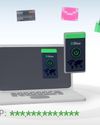
For anyone trying to keep their personal information secure, recent headlines have been a grim kick in the pants. The harshest came last month when the National Public Data breach was disclosed—the source of a purported 2.9 billion records spilling onto the dark web. But it wasn’t the only prominent data leak. In early September, Medicare contacted almost a million beneficiaries about a loss of personal identifiable information related to a vulnerability in third-party software.
In other words, your social security number—central to filing taxes, applying and maintaining credit, and receiving certain U.S. government benefits—is very likely available to hackers and would-be criminals for exploit. And if it isn’t yet, the unfortunate reality is that another data breach will inevitably change that.
You don’t have to wait for trouble to find you, however. You can take several steps to minimize the possibility of identity theft or fraud in your name, since other details like your full name, birthdate, and residence are also likely loose in the wild. Here’s what to do.
1. CHECK TO SEE WHAT DETAILS HAVE LEAKED
This step isn’t strictly necessary since you can take precautionary measures whether or not you’ve been caught in a major data breach. But confirming if your info was leaked can be helpful—like when you’re convincing yourself or loved ones to take action.
Generally you shouldn’t volunteer your personal details to websites claiming to check if you were caught in a data breach, especially if you don’t know who runs them. But several have been vetted, with a couple dedicated specifically to the National Public Data breach—and don’t require sensitive info for verification.
• NPD Breach Check (fave.co/3YmUMTh)
• National Public Data Breach Check & Search (fave.co/3NpIwv5)
This story is from the {{IssueName}} edition of {{MagazineName}}.
Start your 7-day Magzter GOLD free trial to access thousands of curated premium stories, and 9,000+ magazines and newspapers.
Already a subscriber ? Sign In
This story is from the {{IssueName}} edition of {{MagazineName}}.
Start your 7-day Magzter GOLD free trial to access thousands of curated premium stories, and 9,000+ magazines and newspapers.
Already a subscriber? Sign In

Private Internet Access: A low-price, high-value VPN for everyone
This veteran VPN shows it can still hang with the best.

Hands-on: Kensington's first Thunderbolt 5 dock is built for the future
Thunderbolt 5 is here...but you'll need more than just this well-built Kensington dock to take advantage of it.

Tested: Intel's Lunar Lake chip wants you to forget Qualcomm laptops exist
Great battery life, mediocre performance, surprisingly decent gaming: That is how Intel's Lunar Lake chip stacks up.

7 laptop habits that coax the most out of your battery
Don't send your laptop into an early grave.

WordPad is gone from Windows 11. Here's how to bring it back
With the arrival of Windows 11 version 24H2, WordPad is officially gone. Want to keep using it? You're in luck.

Hackers know your social security number. Here's how to stay safe
Thanks to a multitude of data leaks, your most sensitive information is now easily accessible to the world.

20 insanely useful Windows 11 keyboard shortcuts I use every day
After so many years, I'm still discovering new keyboard shortcuts.

WHAT THE HECK IS AN NPU, ANYWAY? HERE'S AN EXPLAINER ON AI CHIPS
ALL PCS WILL SOON HAVE NEURAL PROCESSING UNITS. HERE'S WHAT THAT MEANS FOR YOU IN SIMPLE TERMS.

WINDOWS 11'S 2024 UPDAATE: 5 BIG CHANGES I REALLY LIKE (AND MORE)
WINDOWS 11'S ANNUAL UPDATE IS ROLLING OUT OVER THE NEXT FEW WEEKS.

Hackers are using AI-generated code for malware attacks
Two separate attacks have been spotted using code that was probably written by artificial intelligence.